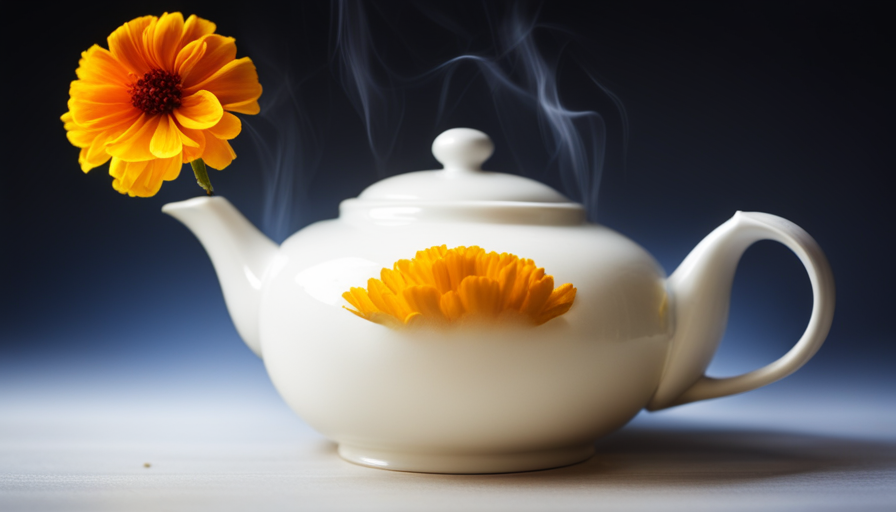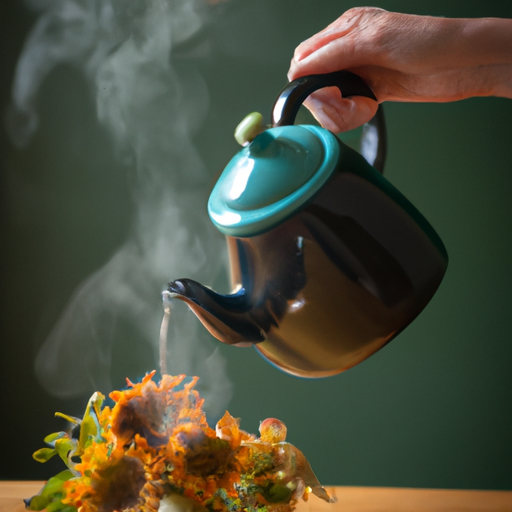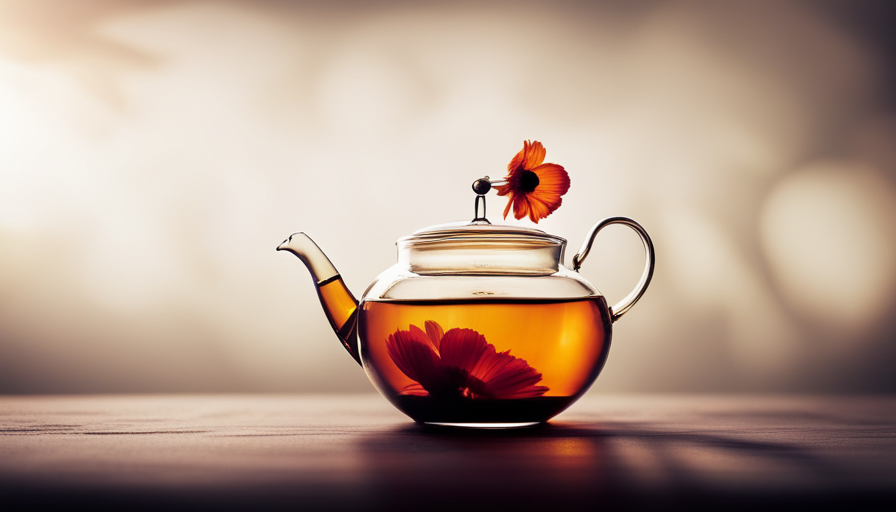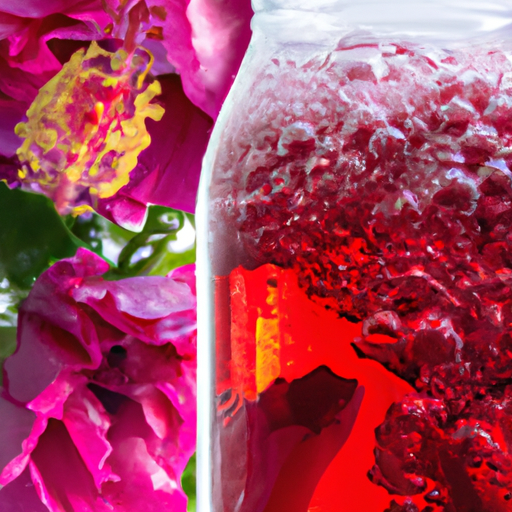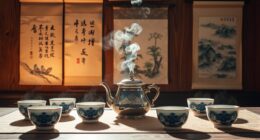Are you aware that there are multiple types of golden flowers that can be brewed into tea?
It may surprise you to learn that these vibrant blossoms not only add beauty to our surroundings but also offer a range of health benefits. In fact, research has shown that consuming golden flower tea can help improve digestion, boost immunity, and promote relaxation. With their delicate aroma and distinct flavors, these teas provide a refreshing and soothing experience for both the body and mind.
One of the most popular golden flower teas is Chrysanthemum tea, which has been cherished in traditional Chinese medicine for centuries. Its floral and slightly sweet taste, combined with its cooling properties, make it a perfect choice for hot summer days.
Another golden flower tea to consider is Chamomile tea, known for its calming effects and ability to promote sleep.
If you’re looking for a fragrant and aromatic option, Jasmine tea is a great choice.
And let’s not forget about Marigold tea, which not only adds a golden hue to your cup but also offers anti-inflammatory properties.
Whether you prefer a delicate floral taste or a more robust flavor, there is a golden flower tea to suit your preferences. So why not explore the world of golden flower teas and discover a new favorite?
Key Takeaways
- Chrysanthemum tea is a popular golden flower tea in traditional Chinese medicine, known for its floral and sweet taste.
- Marigold tea adds a golden hue to your cup and has anti-inflammatory properties.
- Osmanthus tea supports digestion and relaxation.
- Rose tea is packed with antioxidants and vitamins.
Chrysanthemum Tea
Chrysanthemum tea is a delightful and fragrant brew that offers not only a soothing beverage but also a moment of tranquility in a hectic world. Made from the golden petals of the chrysanthemum flower, this tea has been enjoyed for centuries due to its numerous health benefits.
Chrysanthemum tea is known to have anti-inflammatory properties, which can help relieve symptoms of colds, flu, and allergies. It’s also believed to promote heart health by reducing cholesterol levels and improving blood circulation.
To brew chrysanthemum tea, start by rinsing a handful of dried flowers in cold water to remove any impurities. Then, place the flowers in a teapot and pour hot water over them. Let the tea steep for about 5 minutes, allowing the water to extract the flavors and healthful compounds from the petals.
Once the steeping time is complete, strain the tea into cups and enjoy the fragrant aroma and delicate taste.
Transitioning to chamomile tea, another golden flower used as tea, this soothing brew offers its own set of health benefits.
Chamomile Tea
Ironically, you’ll find that sipping on a cup of chamomile will transport you to a state of calm and relaxation. Chamomile tea, derived from the golden flowers of the chamomile plant, has been cherished for centuries for its numerous health benefits. This herbal infusion is not only soothing to the senses but also offers a range of advantages for your well-being.
Chamomile tea is known for its calming properties, making it a popular choice for those seeking to unwind after a long day. It contains a compound called apigenin, which acts as a mild sedative, promoting relaxation and sleep. Additionally, chamomile tea has anti-inflammatory and antioxidant properties that may help reduce inflammation and combat oxidative stress in the body.
To brew chamomile tea, simply follow these steps:
- Boil water in a kettle.
- Place 1-2 teaspoons of dried chamomile flowers in a tea infuser or teapot.
- Pour the hot water over the flowers.
- Let it steep for 5-10 minutes to allow the flavors to infuse.
- Strain the tea and enjoy!
Transitioning to the next section about jasmine tea, it’s worth noting that both chamomile and jasmine teas offer unique benefits that can enhance your tea-drinking experience.
Jasmine Tea
As I take a sip of jasmine tea, the delicate aroma of freshly bloomed flowers fills the air, transporting me to a serene garden. Jasmine tea isn’t just a delight for the senses but also offers numerous health benefits. It’s rich in antioxidants, which can help protect the body against harmful free radicals and reduce the risk of chronic diseases. Additionally, jasmine tea contains compounds that promote relaxation and may help alleviate stress and anxiety.
To brew the perfect cup of jasmine tea, start by using high-quality loose leaf tea. Boil water to around 176-185°F (80-85°C) and pour it over the tea leaves. Let it steep for about 3-5 minutes to allow the flavor to fully develop. Avoid over-steeping, as it can result in a bitter taste.
Sipping on jasmine tea isn’t just a delightful experience, but also a great way to reap its health benefits.
Now, let’s delve into the next golden flower tea that holds its own set of unique qualities – marigold tea.
Marigold Tea
Brewing a cup of marigold tea is like stepping into a vibrant sunset, with its warm hues and invigorating aroma. Marigold tea, derived from the beautiful golden flowers of the marigold plant, offers numerous health benefits and is easy to prepare at home.
Marigold tea is rich in antioxidants, particularly flavonoids and carotenoids, which help fight off harmful free radicals and reduce the risk of chronic diseases. These antioxidants also promote healthy skin by improving collagen production and protecting against UV damage. Additionally, marigold tea is known for its anti-inflammatory properties, which can help alleviate symptoms of arthritis and other inflammatory conditions.
To make marigold tea, start by harvesting the fully bloomed marigold flowers. Separate the petals from the rest of the flower and rinse them thoroughly. Next, bring water to a boil and pour it over the petals in a teapot or cup. Allow the tea to steep for about 5 minutes to extract the maximum flavor and benefits. You can add honey or lemon for a touch of sweetness or acidity, if desired.
Transitioning into the subsequent section about osmanthus tea, osmanthus flowers, with their delicate aroma and golden color, offer a distinct tea experience.
Osmanthus Tea
Indulge in the enchanting fragrance and subtle sweetness of osmanthus tea, a beverage that transports you to a realm of tranquility and joy. Osmanthus tea is made from the fragrant flowers of the osmanthus plant, native to East Asia. This golden flower has been treasured for centuries for its therapeutic properties and delightful taste.
-
Osmanthus tea benefits:
- Rich in antioxidants: Osmanthus flowers are packed with antioxidants that help fight against free radicals and protect your cells from damage.
- Promotes relaxation: The soothing aroma of osmanthus tea can help calm your mind and reduce stress, making it the perfect beverage to unwind after a long day.
- Supports digestion: Osmanthus tea has traditionally been used to aid digestion, relieve bloating, and improve overall gut health.
-
Osmanthus tea recipes:
- Osmanthus Green Tea: Steep a teaspoon of dried osmanthus flowers with your favorite green tea leaves for a refreshing and aromatic blend.
- Osmanthus Black Tea: Add a few osmanthus flowers to a cup of black tea to enhance its flavor and add a floral twist.
- Osmanthus Herbal Infusion: Infuse dried osmanthus flowers with chamomile or lavender for a calming and fragrant herbal infusion.
Transitioning into the subsequent section about ‘rose tea’, the delicate and captivating flavor of rose tea offers a delightful alternative to osmanthus tea.
Rose Tea
After exploring the delicate and fragrant Osmanthus Tea, let’s delve into the world of Rose Tea, another golden flower that can be used to brew a delightful cup of tea.
Rose tea, made from the petals of the Rosa damascena or Rosa centifolia, has been enjoyed for centuries due to its exquisite flavor and numerous health benefits. Not only does rose tea impart a floral and slightly sweet taste, but it’s also packed with antioxidants, vitamins, and minerals. These compounds contribute to its potential health benefits, such as boosting digestion, reducing inflammation, and promoting skin health. Additionally, rose tea is known for its calming properties, making it a popular choice for relaxation and stress relief.
To prepare rose tea, start by selecting fresh and pesticide-free rose petals. Gently rinse them under cold water to remove any impurities. Next, place a handful of petals in a teapot or cup and cover them with boiling water. Allow the petals to steep for about 5-10 minutes, depending on your desired strength. Finally, strain the tea and enjoy it hot or chilled.
Now, let’s move on to explore the fascinating world of hibiscus tea, another golden flower with its own unique qualities.
Hibiscus Tea
When you take a sip of hibiscus tea, the vibrant crimson hue will transport you to a tropical oasis. This delicious and refreshing tea is not only visually appealing but also packed with health benefits. Derived from the vibrant and showy hibiscus flower, this tea offers a unique flavor profile that is both tangy and slightly sweet.
One of the key health benefits of hibiscus tea is its ability to lower blood pressure. Studies have shown that regularly consuming this tea can help reduce high blood pressure levels, thanks to its natural compounds that act as vasodilators. Additionally, hibiscus tea is known to have antioxidant properties, which can help protect the body against damage from harmful free radicals.
To showcase the nutritional value of hibiscus tea, here is a table comparing its key nutrients to those found in other popular teas:
| Nutrients | Hibiscus Tea | Green Tea | Black Tea |
|---|---|---|---|
| Antioxidants | High | Moderate | Low |
| Vitamin C | Yes | Yes | No |
| Caffeine | None | Low | High |
As we delve into the next section about lavender tea, we will explore another golden flower that offers its own unique flavors and health benefits.
Lavender Tea
After exploring the delightful world of Hibiscus tea, I’m now excited to delve into the realm of Lavender tea. Known for its beautiful purple flowers, Lavender is not only aesthetically pleasing but also has a range of health benefits.
Lavender tea is made by infusing the dried flowers of the Lavandula angustifolia plant in hot water. The resulting brew has a distinct floral aroma and a soothing taste that’s both delicious and calming.
Lavender tea has been used for centuries as a natural remedy for various ailments. It’s believed to have anti-inflammatory properties, which can help reduce pain and swelling. Additionally, the tea is known to promote relaxation and improve sleep quality, making it a popular choice for those struggling with insomnia or anxiety.
Studies have also suggested that Lavender tea may have antioxidant properties, which can help protect the body against damage from harmful free radicals. Furthermore, it’s been found to have antibacterial and antifungal properties, potentially aiding in the treatment of skin infections.
Transitioning into the next topic, let’s now explore the wonders of Elderflower tea.
Elderflower Tea
Elderflower tea offers a delicate and floral flavor that’s both refreshing and soothing.
This herbal infusion is known for its ability to boost the immune system. It’s rich in antioxidants and vitamin C.
Additionally, elderflower tea has traditionally been used to relieve cold and flu symptoms. These include congestion, cough, and fever.
Delicate and Floral Flavor
With its delicate and floral flavor, sipping on a cup of golden chamomile tea feels like strolling through a sunlit meadow in full bloom.
Chamomile tea is often paired with delicate and sweet desserts such as macarons or shortbread cookies, as its gentle taste complements the flavors of these treats.
Beyond its culinary uses, chamomile tea has a rich cultural significance in various societies around the world. In many cultures, chamomile is associated with relaxation, soothing properties, and even spiritual healing. The tea is often used as a calming agent, promoting a sense of tranquility and peace.
Chamomile tea has also been known to offer numerous health benefits, including boosting the immune system.
Moving forward, let’s delve into the ways in which chamomile tea can enhance our well-being.
Boosts Immune System
Sipping on a cup of chamomile tea can give your immune system a much-needed boost. Chamomile tea is known for its ability to enhance the body’s natural defense mechanisms. This golden flower contains antioxidants that help to neutralize harmful free radicals and protect against oxidative stress. Additionally, chamomile tea boosts energy levels by promoting relaxation and reducing stress. It also improves digestion by soothing the stomach and relieving gastrointestinal discomfort. The tea’s anti-inflammatory properties can help reduce inflammation in the digestive tract, promoting healthy digestion. Furthermore, chamomile tea has been shown to have antimicrobial effects, which can help fight off infections and strengthen the immune system.
Transitioning to the next section, chamomile tea’s immune-boosting properties also make it effective in relieving cold and flu symptoms.
Relieves Cold and Flu Symptoms
Chamomile tea’s ability to relieve cold and flu symptoms has been attributed to its immune-boosting properties. This golden flower has long been recognized for its medicinal benefits, especially in boosting respiratory health. When consumed as a tea, chamomile can help alleviate congestion, soothe sore throats, and reduce coughing. Its anti-inflammatory properties help to reduce swelling in the airways, making it easier to breathe.
Chamomile tea is also known for its calming effects, which can help promote restful sleep and aid in recovery from illness. As one of the natural remedies for cold and flu, chamomile tea provides a gentle and soothing relief to the discomfort caused by these respiratory infections.
Transitioning to saffron tea, another golden flower with unique health benefits, let’s explore its various properties.
Saffron Tea
Saffron tea, known as the golden elixir, is a rare and exquisite beverage. Derived from the dried stigma of the Crocus sativus flower, saffron tea has been treasured for centuries due to its numerous health benefits. Rich in antioxidants, saffron tea helps to protect the body against oxidative stress and inflammation, promoting overall well-being. This exquisite tea is also known for its mood-enhancing properties, as it stimulates the production of serotonin, a neurotransmitter that regulates mood.
Saffron tea has been used in traditional medicine to alleviate symptoms of various ailments, including cold and flu. It can help relieve congestion, soothe sore throats, and reduce coughing. To maximize the benefits of saffron tea, it is essential to prepare it correctly. Here are two delicious saffron tea recipes:
-
Saffron Green Tea: Brew a cup of green tea and add a pinch of saffron threads. Let it steep for a few minutes before enjoying this fragrant and refreshing beverage.
-
Saffron Milk Tea: Heat a cup of milk and add a few strands of saffron. Simmer for a few minutes, then sweeten with honey or sugar to taste. This creamy and aromatic tea is perfect for relaxation and promoting a good night’s sleep.
Incorporating saffron tea into your daily routine can provide a range of health benefits. Its unique flavor and vibrant color make it an indulgent treat for both the body and the senses.
Frequently Asked Questions
Can golden flower tea help with sleep and relaxation?
Yes, golden flower tea can help with sleep and relaxation. It contains compounds that’ve been shown to reduce anxiety and promote calmness. Drinking golden flower tea about 30 minutes before bedtime is the best time for optimal relaxation. The tea’s active ingredients interact with receptors in the brain, promoting relaxation and reducing stress. Research suggests that incorporating golden flower tea into your bedtime routine can greatly improve sleep quality and overall relaxation.
Are there any potential side effects or allergies associated with drinking golden flower tea?
I recently came across a case study that highlighted the potential side effects of drinking golden flower tea. A woman with a known allergy to daisies experienced a severe allergic reaction after consuming the tea. This suggests that individuals with known allergies to flowers in the daisy family should exercise caution when consuming golden flower tea.
Side effects may include itching, rash, shortness of breath, and swelling. It’s important to consult a healthcare professional before trying this tea, especially if you have any known allergies.
How do you prepare golden flower tea? Are there any specific brewing instructions?
To prepare golden flower tea, start by boiling water. Measure one teaspoon of dried golden flowers per cup of water. Place the flowers in a teapot or infuser and pour the boiling water over them.
Let the tea steep for 5-7 minutes, then strain the flowers and enjoy. Golden flower tea is rich in antioxidants, which can promote overall health and boost the immune system. It may also have anti-inflammatory properties and aid digestion.
Can golden flower tea be consumed by pregnant women or individuals with certain medical conditions?
Pregnancy safety is a crucial consideration when consuming golden flower tea. It’s essential to consult a healthcare professional before including it in your diet.
Additionally, individuals with certain medical conditions should exercise caution. Golden flower tea may have potential medical contraindications due to its active compounds. Therefore, it’s vital to understand the potential risks and benefits before consuming this tea, especially during pregnancy or if you have specific medical conditions.
Are there any traditional or cultural uses of golden flower tea apart from its potential health benefits?
Golden flower tea holds cultural significance and is used in various traditional rituals. It has been deeply rooted in the customs of certain communities for centuries. The tea is often served during religious ceremonies, weddings, and other important events as a symbol of prosperity, good luck, and blessings. Its vibrant color and delicate floral aroma add a touch of elegance to these occasions.
Apart from its potential health benefits, golden flower tea plays a vital role in preserving cultural traditions and enhancing the overall experience of these rituals.
Conclusion
So, in conclusion, the world of golden flower teas is a treasure trove of delightful flavors and enticing aromas. Each flower brings its own unique characteristics to the tea, offering a sensory experience like no other.
From the soothing Chamomile to the invigorating Jasmine, and the exotic Saffron to the fragrant Osmanthus, there’s a golden flower tea for every palate.
So why not explore this golden realm and let your taste buds embark on an enchanting journey through the world of teas? Happy sipping!

